Window AC Sound Like Running Water {Causes & Solutions}
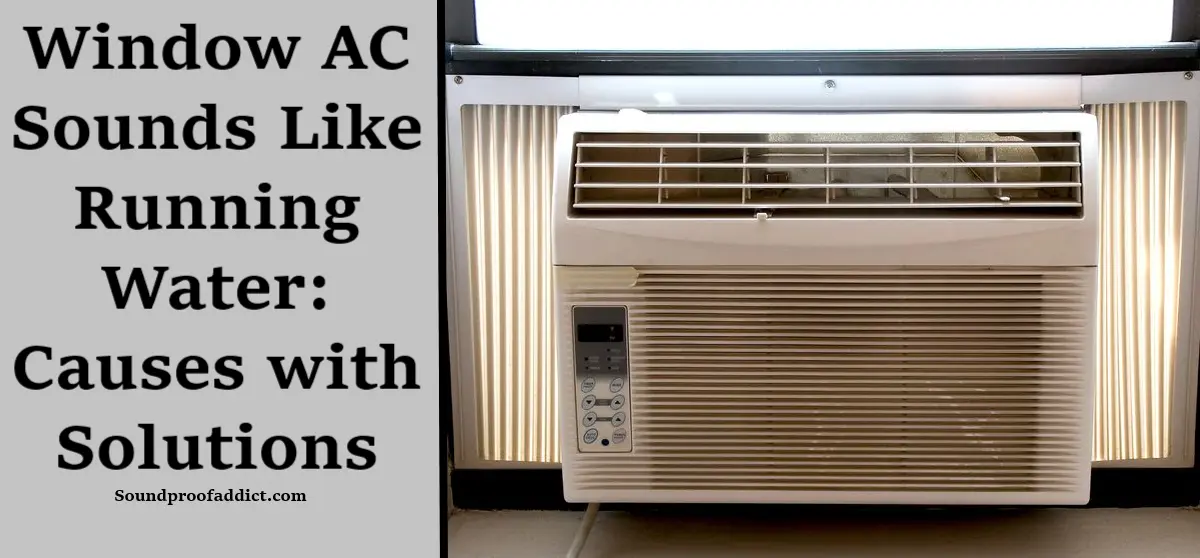
Imagine you are relaxing in your living room, enjoying the cool breeze from your window air conditioner, when suddenly you hear the sound of running water from your window AC unit. It’s not exactly the soothing sound you were expecting.
If your window AC sounds like running water, it could be due to condensation, a dirty evaporator coil, air bubbles in the refrigerant lines, or water leakage.
Let’s explore in more detail why your window AC may sound like running water and how you can fix it.
Why is your window ac sound like running water?
Here are the causes of why your window ac is making sound like running water:
1. Condensation
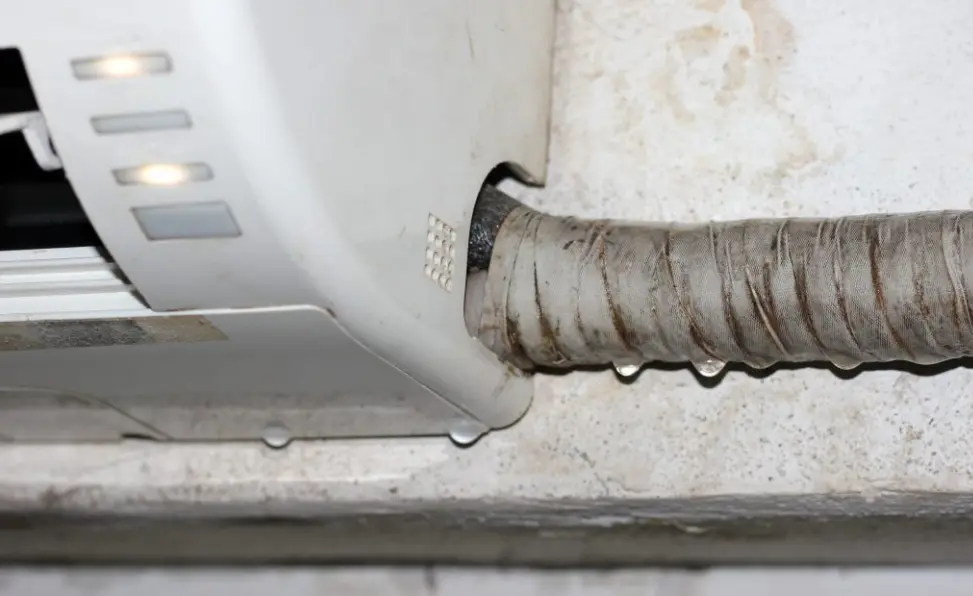
Window AC units remove moisture from the air as they cool it down. This moisture usually collects in a drip pan or drain pan and is drained outside through a small pipe.
However, if that drain line gets blocked or clogged, water will accumulate and create a gurgling or running water sound.
In such cases, you can try cleaning or clearing the drain line to ensure proper water drainage.
2. Evaporator coil issues
Another reason could be an issue with the evaporator coil. This coil can sometimes get dirty or clogged with dust, debris, or even mold.
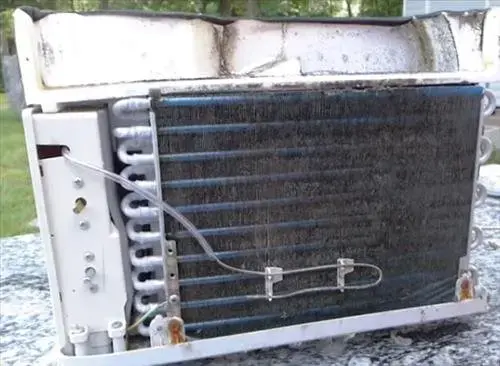
When air passes through a dirty coil, it can cause a bubbling or gurgling sound. To fix this, you can clean or service the coil to restore its proper function.
3. Water leakage
If you notice water leaking from the AC unit itself, it can create a dripping water sound.
This may be caused by a malfunctioning part, such as a damaged condensate pan, Improper Installation or a loose connection.
It’s important to address this promptly to prevent further damage and potential water-related problems.
4. A dirty or clogged air filter
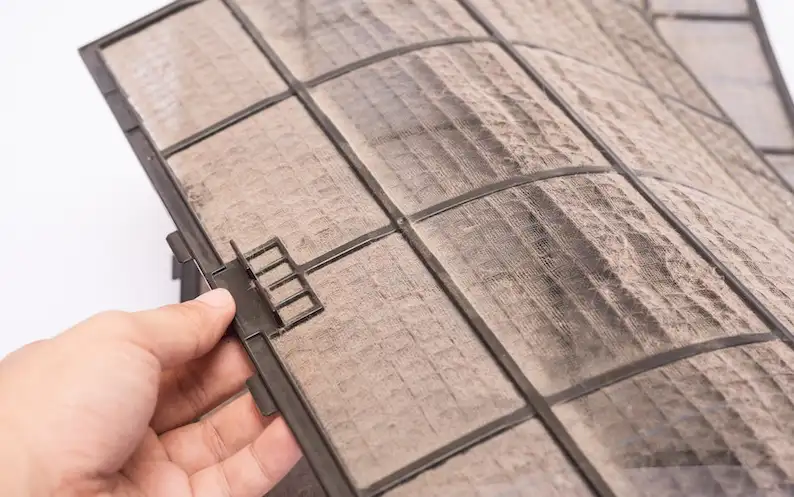
Another possible reason for the running water sound is a dirty or clogged air filter. When the filter gets dirty, it blocks the airflow, which leads to excess moisture building up. This buildup can create a sound similar to water flowing or gurgling.
5. Air bubbles in the refrigerant lines
Sometimes, air bubbles can get trapped in the refrigerant lines, can leads to a gurgling or running water sound as the refrigerant circulates.
While this issue is pretty rare compared to above four causes and also a bit more complex and usually requires an HVAC technician to fix.
They can evacuate the air from the system and recharge it with refrigerant to resolve the issue.
Find out the quietest window AC models for a peaceful cooling experience.
How to stop the sound of running water from window AC units?
Now, let’s go through some simple steps to help you troubleshoot the Running Water Sound from Your Window AC and fix the issue.
Step 1: Check for Drainage Issues
First, take a look at the drainage system of your AC unit. Make sure the drainpipe is not blocked or clogged. A clear drainpipe is essential for smooth water flow.
Also, ensure that the drainpipe has a proper slope, so water can easily move out. If you find any clogs or obstructions, try unclogging the drain pipe or adjusting its position to resolve the problem.
Step 2: Clean or Replace the Filter
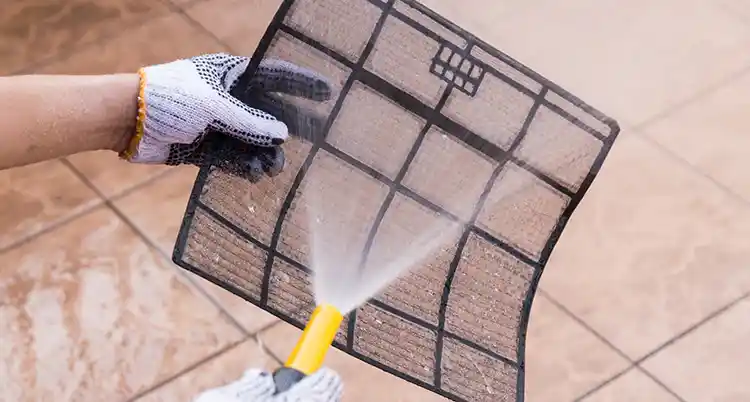
A dirty or clogged air filter can be another culprit behind the running water sound. The air filter helps maintain good airflow, and when it gets dirty, it can lead to excess moisture buildup.
Check your AC’s filter and clean it if possible. If it’s too dirty, consider replacing it with a new one.
Step 3: Inspect the Condensate Pan
The condensate pan is responsible for collecting the water condensed by your AC unit. Sometimes, if the pan is damaged or not properly aligned, it can cause water to overflow and create the running or dripping water sound.
Take a look at the pan and check for any cracks or misplacements. If you find any issues, fix them ASAP to stop the water running sounds.
Step 4: Clean the evaporator coils
Another thing to keep in mind when you’re trying to fix that running water sound coming from your window AC is the cleanliness of the evaporator coil.
The evaporator coil is an important part of the cooling process, and if it gets dirty, it can lead to more moisture building up and causing that water sound.
So, give those coils a clean every six months to keep it nice and clean and prevent your window AC from making those running water sounds.
How can you Prevent the Sound of Running Water in Your Window AC?
To prevent your window ac from making sound of running water, there are a few preventive measures you can take.
1. Regular Maintenance
First is regular maintenance. It’s essential to schedule regular maintenance for your AC unit. This includes simple tasks like cleaning or replacing the filter.
A dirty filter can restrict airflow and lead to excess moisture buildup, causing the running water sound.
Additionally, inspect the drainage system and ensure all components are in good working condition.
Regular maintenance can catch potential issues early on and prevent them from turning into major problems.
2. Proper Installation
Ensure that your window AC unit is installed correctly. Improper installation can result in drainage problems, which can contribute to the running water sound from your AC unit.
Not only this but will also reduce the airflow of your unit and this can make your window ac unit more noisy.
3. Ensure Proper Drainage
Regularly check the drainage system of your window AC and make sure it’s functioning correctly. Clear any debris or obstructions that might prevent the water flow.
It’s also important to ensure that the drainpipe has a downward slope. This slope allows water to flow efficiently out of the system, preventing any water buildup that could lead to the running water like sound.
FAQs: Window Air Conditioner Sound like Running Water
1. Is the running water sound in my window AC harmful?
Ans: No, the running water sound itself is not harmful. However, it’s essential to address the issue to prevent any potential damage to the AC unit or its components.
2. Can a clogged air filter cause the running water sound?
Ans: Yes, a clogged or dirty air filter can restrict airflow and lead to excess moisture buildup, resulting in the running water sound. Regularly cleaning or replacing the filter can help resolve the issue.
3. Is water leakage a serious problem if my window AC sounds like running water?
Ans: Water leakage can be a cause for concern, as it may indicate a malfunctioning part or a loose connection. It’s important to address this promptly to prevent further damage or potential water-related issues.
My final thought
If your window AC sounds like running water, it’s probably due to condensation, a dirty coil, water leakage, a clogged filter, or air bubbles in the lines. But the most common of them is condensation and water leakage.
To fix it, check the drainage, clean or replace the filter, inspect and fix leaks, and clean the coils. Regular maintenance, proper installation, and good drainage help prevent the sound.
By understanding the causes and following the troubleshooting steps mentioned above, you can address the issue and enjoy a quieter cooling experience.
More on Window AC:
Learn 11 effective ways to make your noisy window ac quieter.
